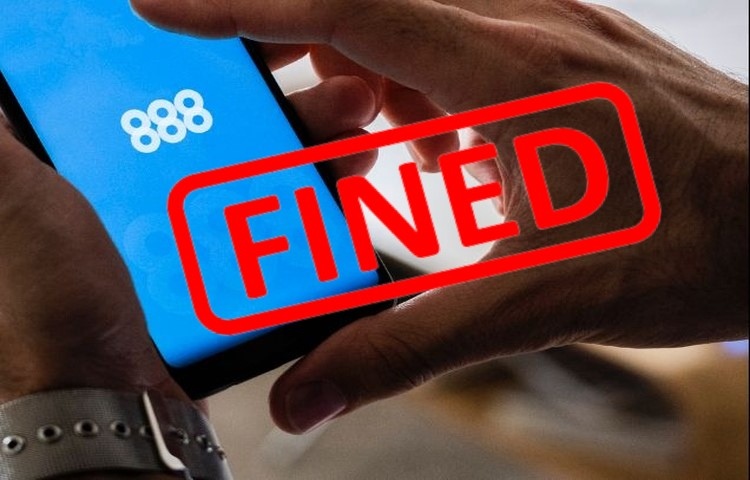 The United Kingdom Gambling Commission is responsible for the regulation of betting companies in the UK. If a company fails in its duties, such as protecting customers or stopping the possibility of money laundering from happening, it is the UKGC that will move to correct the situation.
The United Kingdom Gambling Commission is responsible for the regulation of betting companies in the UK. If a company fails in its duties, such as protecting customers or stopping the possibility of money laundering from happening, it is the UKGC that will move to correct the situation.
Whilst the organisation does have the ability to suspend or even revoke the licence of an offending business, which it has done in the past, it is far more common for a fine to be issued. For many, the fines that the Gambling Commission puts in place aren’t anywhere near big enough at present.
A lot of the time, whatever amount of money they UKGC issues as a fine can be made back by gambling companies in a matter of days. When 888 Group, the owner of William Hill, was issued with a £19.2 million fine in 2023, for example, the Guardian worked out that it would take about four days for the company to make that money back.
When you compare the sorts of fines that gambling companies are hit with to the size of fines that financial institutions have to pay, there is no meaningful comparison and it is fair to ask whether they are big enough or should be larger.
Looking At The Fines Issues
 If we’re going to consider whether or not the fines that are issues to companies by the Gambling Commission are big enough, we must first take a look at some of the fines that the UKGC has handed out over the years. The Gambling Commission was set up as part of the Gambling Act that was signed into law in 2005.
If we’re going to consider whether or not the fines that are issues to companies by the Gambling Commission are big enough, we must first take a look at some of the fines that the UKGC has handed out over the years. The Gambling Commission was set up as part of the Gambling Act that was signed into law in 2005.
The organisation became active two years later, but looking back to then would be time-consuming and perhaps not all that useful. Instead, we will look back at some of the fines issued during a period beginning in 2016 and going through to April of 2023, looking at when the fine was issued rather than when the failing took place.
2016
 In June of 2016, Betfred were fined £800,000 after the company accepted stolen cash from one of its VIP customers. It failed to live up to its obligations around social responsibility and the need to prevent possible money laundering. After a review of the company’s licence was carried out, Betfred were ordered to pay more than £800,000 towards ‘socially responsible causes’. The victims of the criminal activity of Matthew Stevens were paid £443,000, whilst £344,500 was paid to the socially responsible causes.
In June of 2016, Betfred were fined £800,000 after the company accepted stolen cash from one of its VIP customers. It failed to live up to its obligations around social responsibility and the need to prevent possible money laundering. After a review of the company’s licence was carried out, Betfred were ordered to pay more than £800,000 towards ‘socially responsible causes’. The victims of the criminal activity of Matthew Stevens were paid £443,000, whilst £344,500 was paid to the socially responsible causes.
A month later and Camelot, the operator of the National Lottery in the UK, was fined £300,000 after incorrect results were published for the Millionaire Maker raffle. The incident happened on the 10th of October the years before, which was when an incorrect set of results were published on the website and seen by in excess of 100,000 people. Two more incidents were recorded as breaches of the company’s licence, but a decision to add additional sanctions was not taken by the UKGC in that instance.
At the end of the year Camelot were once again in the news, this time thanks to a £3 million fine that it was hit with as a financial penalty. That was thanks to an incident of fraud that was detected when the operator paid out £2,525,485 in 2009. The winning ticket was reported to have been bought in Worcestershire, but in actual fact a member of the public had conspired with a member of the National Lottery’s fraud department to create a fake ticket and claim the prize. The ‘serious failings’ of Camelot were, it was believed, reflected in the fine issued.
2017
 In May of 2017, the Gambling Commission issued a fine of £300,000 to BGO Entertainment Limited, a company based in Guernsey because of nine misleading advertisements that had appeared on the company’s website between July of 2015 and July of the following year. These misleading adverts also appeared on the website of affiliates between February and October of 2016. All licensed operators are signed up to the UKGC’s Licence Conditions and Codes of Practice, which say that promotions cannot be misleading and that a ‘free bet’ or ‘bonus’ or the likes must actually mean what it says and outline what needs to be done to take advantage.
In May of 2017, the Gambling Commission issued a fine of £300,000 to BGO Entertainment Limited, a company based in Guernsey because of nine misleading advertisements that had appeared on the company’s website between July of 2015 and July of the following year. These misleading adverts also appeared on the website of affiliates between February and October of 2016. All licensed operators are signed up to the UKGC’s Licence Conditions and Codes of Practice, which say that promotions cannot be misleading and that a ‘free bet’ or ‘bonus’ or the likes must actually mean what it says and outline what needs to be done to take advantage.
Fast-forward to August and 888 was issued with a fine of £7.8 million. The fine was given to the company because of ‘outrageous’ failings when 7,000 people who had self-excluded from placing bets were still able to get onto their accounts. A customer was able to bet more than £1.3 million across 850,000 wagers, using money that they had stolen from an employer. Customers who had self-excluded were able to deposit £3.5 million into their combined accounts and gamble £51 million in deposits and recycled winnings. There were ‘serious concerns’ raised as a result.
2018
 In March of 2018, SkyBet was fined £1 million for failing to protect vulnerable customers. People that had asked to be barred from betting were able to open accounts, with around 50,000 people sent promotional material even after they had asked not to be. At the time, GamStop still hadn’t been properly launched and so companies were supposed to ensure that their own self-exclusion tools were working properly. There were 736 people who had self-excluded with SkyBet, only to be able to open accounts and place bets, whilst 36,748 closed their accounts but didn’t get their balances returned to them.
In March of 2018, SkyBet was fined £1 million for failing to protect vulnerable customers. People that had asked to be barred from betting were able to open accounts, with around 50,000 people sent promotional material even after they had asked not to be. At the time, GamStop still hadn’t been properly launched and so companies were supposed to ensure that their own self-exclusion tools were working properly. There were 736 people who had self-excluded with SkyBet, only to be able to open accounts and place bets, whilst 36,748 closed their accounts but didn’t get their balances returned to them.
A couple of months later and 32Red was ordered to pay £2 million after a problem gambler was granted VIP status. There were 22 incidents when the customer’s behaviour should’ve resulted in a red flag being raised, including when the customer themselves told member of stand that they were gambling too much. Instead, the customer was able to deposit £758,000 between 2014 and 2017, with no checks carried out regarding possible money laundering or social responsibility. Instead, free bonuses were given out to encourage more betting, with investigations only launched when they won a seven-figure sum but continued to gamble.
In October of 2018, Paddy Power Betfair was fined £2,200,000, This came after the betting group had failed to stop a customer who was displaying signs of problem gambling from placing bets. Not only that, but a customer was able to bet with money that he had stolen from a charity that he worked for. Other failings were seen in three customers that bet online and in shops, with issues noted in the way the customer’s social responsibility checks were carried out. Of the £2.2 million that was paid out by Paddy Power Betfair, £1.7 million was donates to Gamble Aware, the gambling charity.
The biggest fine of 2018 came when Daub Alderney was fined £7,100,000. That came on the back of failures around money laundering and social responsibility. The failures were from Stride, a company that came under the banner of Daub Alderney, with the company showing ‘significant limitations’ in terms of its ability to proactively identify problem gamblers and mitigate any risks. The company was issued with a warning, but a fine was also seen as being appropriate on account of the seriousness of the failings. £7.1 million was seen as an ‘appropriate’ and ‘proportionate’ fine to be issued to the operator.
2019
 In Touch Games Limited was fined £2.2 million in May of 2019, with the main reason being a failure of anti-money laundering requirements. The company didn’t do enough to prevent possible money laundering, with high-risk customers not identified and Know Your Customer policies either not in place or else designed poorly. Whether a customer could afford what they were gambling wasn’t checked well enough, with a 13-month investigation resulting in the eventual fine. In Touch Games is one of the best examples of why fines themselves might not be enough to discourage poor behaviour from gambling companies, as you’ll come to discover.
In Touch Games Limited was fined £2.2 million in May of 2019, with the main reason being a failure of anti-money laundering requirements. The company didn’t do enough to prevent possible money laundering, with high-risk customers not identified and Know Your Customer policies either not in place or else designed poorly. Whether a customer could afford what they were gambling wasn’t checked well enough, with a 13-month investigation resulting in the eventual fine. In Touch Games is one of the best examples of why fines themselves might not be enough to discourage poor behaviour from gambling companies, as you’ll come to discover.
Ladbrokes Coral Group was hit with a £5.9 million fine in July of 2019 when systemic failings meant that problem gamblers were not protected, instead being allowed to gamble thousands of pounds. It was one of the largest penalties issued by the UKGC at the time, with a ‘litany of transgressions’ highlighted by the Gambling Commission when the fine was issued. Rather than investigating the situations that customers found themselves in, Ladbrokes Coral instead chose to reduce the number of customers that were considered ‘high risk’. One customer lost £1.5 million over three years and wasn’t asked to provide source of funds, for example.
2020
 William Hill owned Mr Green was fined £3 million in February of 2020 when the company didn’t prevent money laundering or protect clients who were seen as problem gamblers. The UKGC issued the fine after a customer won £50,000 then gambled it all away, adding more money to it without their account being frozen. There was also a deposit of more than £1 million made by a customer who used a 10-year-old claim of £176,000 as proof that they would afford it. Another punter used a photograph of a laptop screen showing a cryptocurrency trading account as proof of affordability.
William Hill owned Mr Green was fined £3 million in February of 2020 when the company didn’t prevent money laundering or protect clients who were seen as problem gamblers. The UKGC issued the fine after a customer won £50,000 then gambled it all away, adding more money to it without their account being frozen. There was also a deposit of more than £1 million made by a customer who used a 10-year-old claim of £176,000 as proof that they would afford it. Another punter used a photograph of a laptop screen showing a cryptocurrency trading account as proof of affordability.
A new record was set in March of 2020 when Betway was fined £11.6 million when the company accepted stolen money from some of its VIP clients. This was in spite of the fact that they were showing clear signs of being problem gamblers. Some of the £5.8 million that Betway had allowed to be gambled on its site was stolen money, whilst others failed to provide satisfactory proof that the money that they were gambling with was theirs. One customer deposited £8 million over four years, in spite of the fact that their account was flagged as being a risk 20 times, but staff simply accepted the customer’s word that the money was theirs to be betting with.
The record didn’t last long, with Caesers Entertainment UK fined £13 million the following month. That was thanks to failures around the VIP scheme that the regulator was considering banning at the time. Having been accused of being ‘too weak’, it was felt that the record fines, issued within three weeks of each other, were an attempt from the regulator to show some teeth. One customer lost £323,000 in spite of showing signs of being a problem gambler, whilst another lost £240,000 over a three-year period even though they had chosen to self-exclude from being able to place any bets at all.
After two record fines, the fact that BGO Entertainment was hit with a £2 million punishment might seem like small beans. It is worth flagging up here though, on account of the fact that we’ve already written about the business having to pay a £300,000 fine in 2017 because of misleading adverts.
The UKGC issued a statement confirming that it had failed in its anti-money laundering responsibilities, as well as social care. One customer lost more than £159,000 in three months, when a significant number of responsible gambling triggers weren’t given sufficient interaction by the operator and instead relied upon the likes of pop-up messages. As a result BGO ended up going out of business.
2021
 In Touch Games Limited were back in the news in 2021 when they were fined £3.4 million thanks to anti-money laundering failures and an inability to protect customers. The company, which was responsible for the likes of MFortune, MrSpin, CashMo, PocketWin and SlotFactory.com, had paid a fine of £2.2 million in May of 2019 for similar failings, proving that issuing fines doesn’t seem to make much a difference to a company’s ability to do what they agree to do when they are issued with a licence. The organisation’s licence was placed under review this time, in addition to the fine being issued to the business for its various failures.
In Touch Games Limited were back in the news in 2021 when they were fined £3.4 million thanks to anti-money laundering failures and an inability to protect customers. The company, which was responsible for the likes of MFortune, MrSpin, CashMo, PocketWin and SlotFactory.com, had paid a fine of £2.2 million in May of 2019 for similar failings, proving that issuing fines doesn’t seem to make much a difference to a company’s ability to do what they agree to do when they are issued with a licence. The organisation’s licence was placed under review this time, in addition to the fine being issued to the business for its various failures.
Daub Alderney were back in the news in 2021, having been fined £7.1 million in 2018, this time being fined £5.85 million. An investigation carried out by the UKGC found that there had been failures in social responsibility and anti-money laundering in some sites that were not actually under the ownership of Daub Alderney at the time. The Gambling Commission reminded operators that they would be given a fine even if failings didn’t happen on their watch. Failures included a customer being able to lose £43,410 across three months, despite showing that they were probably a problem gamblers and used four different payment cards in one day.
2022
 As a sign that the Gambling Commission will sometimes do more than just issue fines, Genesis Global Limited had its licence suspended in addition to being made to pay £3.8 million. The group was the parent company of as many as 14 different websites, with a further audit being called for by the UKGC. The business had been suspended from operating in Britain already but the suspension was lifted after compliance. When further failings occurred, therefore, it seemed clear that a big fine and a licence suspension would be necessary. With that in mind, the UKGC issued the fine of £3.8 million to the operator.
As a sign that the Gambling Commission will sometimes do more than just issue fines, Genesis Global Limited had its licence suspended in addition to being made to pay £3.8 million. The group was the parent company of as many as 14 different websites, with a further audit being called for by the UKGC. The business had been suspended from operating in Britain already but the suspension was lifted after compliance. When further failings occurred, therefore, it seemed clear that a big fine and a licence suspension would be necessary. With that in mind, the UKGC issued the fine of £3.8 million to the operator.
In March of 2022, 888 was fined £9.4 million after an investigation by the Gambling Commission found that there had been failings around both the anti-money laundering and social responsibilities that companies agree to when they get their licence. 888 operates as many as 78 websites, with the fine issued in 2022 following on from the £7.8 million that the company paid in 2017. Both cases involved failing their customers, which is why one of the largest fines issued by the UKGC was seen as being the necessary action to be taken against them the second time around. Whilst not a record, it was still a large fine all things considered.
Entain was fined £17 million in August of 2022, which was a record amount at the time. The fine was given to the company on account of failures around anti-money laundering and social responsibility. £14 million was owed for 13 websites run by the company, including both Coral and Ladbrokes. A further £3 million was issued because of failures at Ladbrokes premises around the country. Additional licence conditions were also put in place, with the aim being to ensure that the company stopped falling foul of the terms and conditions of the licence issued by the UKGC.
2023
 In Touch Games Limited were back in the news at the start of 2023, this time because they were fined £6.1 million. The company, which operated 11 websites at the time, was assessed by the Gambling Commission and issued with the third fine in four years by the gambling regulator. Having paid £2.2 million in 2019 and £3.4 million two years later, the fine in 2023 was nearly double the previous one. It was hoped that there would be ‘significant improvement’ after the history of failings that had been seen. Failures included anti-money laundering, with no appropriate policies and procedures in place to assess where money came from.
In Touch Games Limited were back in the news at the start of 2023, this time because they were fined £6.1 million. The company, which operated 11 websites at the time, was assessed by the Gambling Commission and issued with the third fine in four years by the gambling regulator. Having paid £2.2 million in 2019 and £3.4 million two years later, the fine in 2023 was nearly double the previous one. It was hoped that there would be ‘significant improvement’ after the history of failings that had been seen. Failures included anti-money laundering, with no appropriate policies and procedures in place to assess where money came from.
32Red Limited were fined £4.1 million, which happened at the same time as Platinum Gaming Limited were fined nearly £3 million. Both companies were also given an official warning from the UKGC, largely because they both failed to protect their customers. There were both social responsibility failures as well as ant-money laundering failures, which make up the majority of the issues that the Gambling Commission tends to issue fines for. When operators fail to protect customers, that is a serious issue, whilst the notion of money being laundered via gambling companies is also a major concern of the regulator, hence such large fines.
At the time of writing, the largest fine issued by the Gambling Commission is £19.2 million, which William Hill had to pay in 2023. This was due to ‘widespread and alarming failures’ from the company, including customers being able to bet large sums of money over short periods of time without sufficient checks being carried out. One case, for example, a customer opened an account and bet £23,000 in 20 minutes without any checks taking place. The money was split between three subsidiaries of William Hill, with £12.5 million paid for the company’s online site, £3 million for physical branches and £3.7 million for mrgreen.com.
Are The Fines Enough?

When you consider that the fines listed above are only the tip of the iceberg around fines issued by the UKGC and the fact that numerous companies have been issued with multiple fines over the years, it is difficult to conclude anything other than the fact that the fines themselves are not good enough.
If they were, you would imagine that companies would not then repeat their behaviour. Instead, businesses repeatedly carry out failures that they’ve already been punished for. It seems to be the case that this is because the companies know that the fines are less than the money they’ll make.
It is also worth comparing the fines that are paid by gambling companies to those that are issued to businesses by the Financial Conduct Authority when financial businesses fail in their responsibilities. In December of 2022, for example, TSB Bank was made to pay £29.75 million for breaches of their licence, which is more than any company has ever been fined by the UKGC.
Santander, meanwhile, paid £107,793,300 in the same month for failings. Why is it that the Gambling Commission’s fines are so small in relation to those issued by the FCA?
